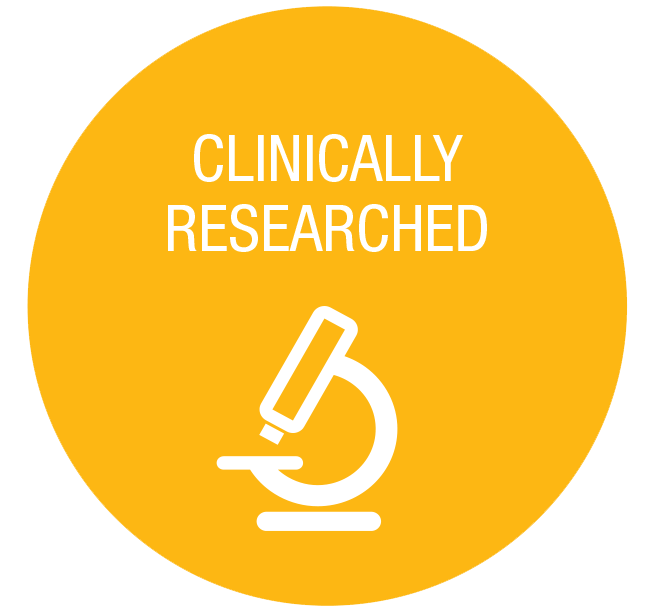OVER A DOZEN PUBLISHED TRIALS
Not all research is created equal. The EpiCor® brand is built upon over 75 years of science and research in our health and wellness technology. We’re absolutely committed to meeting or exceeding governmental and industry standards for safety and performance. Our scientific studies are well designed and follow strict protocols. Studies on EpiCor® include:
- Eight published human clinical trials (1, 3, 4, 6, 7, 8, 12, 14)
- Seven published preclinical studies (2, 5, 9, 10, 11, 13, 15)
All of EpiCor® postbiotic’s studies are made available to dietary supplement manufacturers, health care practitioners and other professionals in the industry on our website. Manufacturers use this information to explain the benefits of EpiCor® postbiotic that comply with the applicable rules of different governments throughout the world.

RESEARCH SHOWS EPICOR® POSTBIOTIC PROVIDES:
SAFETY IS PRIORITY
At Cargill, we want people to live healthy lives. That’s why producing safe and high-quality supplement ingredients like EpiCor® postbiotic is an absolute priority for us. EpiCor® postbiotic has several published human clinical trials and a series of safety studies published in the International Journal of Toxicology.
Not only do we have the science for safety, EpiCor® postbiotic is made in the USA in a state-of the-art facility located in Ankeny, Iowa. Our facility follows all current Good Manufacturing Practices, which is regularly certified by NSF. There is also a HACCP plan in place for the production of EpiCor® postbiotic.
EpiCor® postbiotic is also Non-GMO Project Verified, Self-affirmed GRAS, Vegan, Gluten-Free, OU Kosher, BSE/TSE-Free and Halal. The combined research, high-quality manufacturing facilities, certification and designations support that EpiCor® postbiotic is safe for consumption by healthy adults and children.
LIST OF STUDIES
- 1. Schauss, A. G.; Vodjani, A., Discovery of edible fermentation product with unusual immune enhancing properties in humans. FASEB J 2006, 20 (4), A143. [Online reference: https://www.fasebj.org/doi/abs/10.1096/fasebj.20.4.A143-c]
- 2. Jensen, G. S., et al. An anti-inflammatory immunogen from yeast culture induces activation and alters chemokine receptor expression on human natural killer cells and B lymphocytes in vitro. Nutrition Research 2007, 27, 327-335. [Online reference: https://www.researchgate.net/publication/257104459]
- 3. Moyad, M. A., et al. Effects of a modified yeast supplement on cold/flu symptoms. Urol Nurs 2008, 28 (1), 50-5. [Online reference: http://www.ncbi.nlm.nih.gov/pubmed/18335698]
- 4. Jensen, G. S., et al. A double-blind placebo-controlled, randomized pilot study: consumption of a high-metabolite immunogen from yeast culture has beneficial effects on erythrocyte health and mucosal immune protection in healthy subjects. Open Nutr J 2008, 2, 68-75. [Online reference: https://opennutritionjournal.com/VOLUME/2/PAGE/68/ABSTRACT/]
- 5. Honzel, D, et al. Comparison of chemical and cell-based antioxidant methods for evaluation of foods and natural products: generating multifaceted data by parallel testing using erythrocytes and polymorphonuclear cells. J Agric Food Chem 2008, 56 (18), 8319-25. [Online reference: https://www.ncbi.nlm.nih.gov/pmc/articles/PMC6498863]
- 6. Moyad, M. A., et al. Immunogenic yeast-based fermentation product reduces allergic rhinitis-induced nasal congestion: a randomized, double-blind, placebo-controlled trial. Adv Ther 2009, 26 (8), 795-804. [Online reference: https://www.ncbi.nlm.nih.gov/pubmed/19672568]
- 7. Moyad, M. A., et all. Immunogenic yeast-based fermentate for cold/flu-like symptoms in nonvaccinated individuals. J Altern Complement Med 2010, 16 (2), 213-8. [Online reference: https://pubmed.ncbi.nlm.nih.gov/20180695/]
- 8. Jensen, G. S., et al. Antioxidant bioavailability and rapid immune-modulating effects after consumption of a single acute dose of a high-metabolite yeast immunogen: results of a placebo-controlled double-blinded crossover pilot study. J Med Food 2010, 14, 1002–1010. [Online reference: https://www.sciencedirect.com/science/article/abs/pii/S0271531707000978]
- 9. Evans, M., et all. A dried yeast fermentate prevents and reduces inflammation in two separate experimental immune models. Evid Based Complement Alternat Med 2012, 2012, 7. [Online reference: http://www.ncbi.nlm.nih.gov/pmc/articles/PMC3328167]
- 10. Possemiers, S., et al. A dried yeast fermentate selectively modulates both the luminal and mucosal gut microbiota and protects against inflammation, as studied in an integrated in vitro approach. J Agric Food Chem 2013, 61 (39), 9380-9392. [Online reference: http://www.ncbi.nlm.nih.gov/pubmed/24006902]
- 11. Marzorati, M., et al. The HMI module: a new tool to study the Host-Microbiota Interaction in the human gastrointestinal tract in vitro. BMC Microbiol 2014, 14 (1), 133. [Online reference: http://www.ncbi.nlm.nih.gov/pmc/articles/PMC4039060/]
- 12. Jensen, G. S., et all. Anti-inflammatory properties of a dried fermentate in vitro and in vivo. J Med Food 2014, 18(3), 378-84. [Online reference: http://www.ncbi.nlm.nih.gov/pubmed/25105458]
- 13. Durcray, H.A.G., et al. Mitigation of heat stress-related complications by a yeast fermentate product. Jl Therm Bio 2016 , 60,26–32. [Online reference: https://www.ncbi.nlm.nih.gov/pubmed/27503713]
- 14. Pinheiro, I., et al. .A yeast fermentate improves gastrointestinal discomfort and constipation by modulation of the gut microbiome: results from a randomized double-blind placebo-controlled pilot trial. BMC Complement Altern Med 2017, 17 (1), 441. [Online reference: https://www.ncbi.nlm.nih.gov/pmc/articles/PMC5584023/]
- 15. Ducray, H.A.G., et al. Yeast fermentate prebiotic improves intestinal barrier integrity during heat stress by modulation of the gut microbiota in rats. J Appl Microbiol 2019, 127, 1192—1206. [Online reference: https://www.ncbi.nlm.nih.gov/pubmed/31230390]
